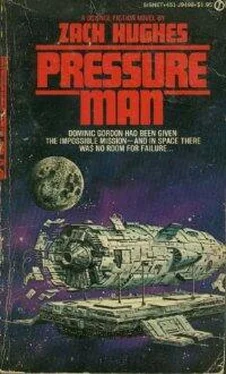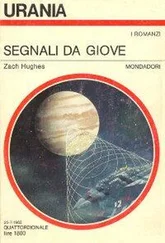Zach Hughes - Pressure Man
Здесь есть возможность читать онлайн «Zach Hughes - Pressure Man» весь текст электронной книги совершенно бесплатно (целиком полную версию без сокращений). В некоторых случаях можно слушать аудио, скачать через торрент в формате fb2 и присутствует краткое содержание. Год выпуска: 1980, ISBN: 1980, Издательство: Signet / New American Library, Жанр: Фантастика и фэнтези, на английском языке. Описание произведения, (предисловие) а так же отзывы посетителей доступны на портале библиотеки ЛибКат.
- Название:Pressure Man
- Автор:
- Издательство:Signet / New American Library
- Жанр:
- Год:1980
- ISBN:0-451-09498-0
- Рейтинг книги:5 / 5. Голосов: 1
-
Избранное:Добавить в избранное
- Отзывы:
-
Ваша оценка:
- 100
- 1
- 2
- 3
- 4
- 5
Pressure Man: краткое содержание, описание и аннотация
Предлагаем к чтению аннотацию, описание, краткое содержание или предисловие (зависит от того, что написал сам автор книги «Pressure Man»). Если вы не нашли необходимую информацию о книге — напишите в комментариях, мы постараемся отыскать её.
Pressure Man — читать онлайн бесплатно полную книгу (весь текст) целиком
Ниже представлен текст книги, разбитый по страницам. Система сохранения места последней прочитанной страницы, позволяет с удобством читать онлайн бесплатно книгу «Pressure Man», без необходимости каждый раз заново искать на чём Вы остановились. Поставьте закладку, и сможете в любой момент перейти на страницу, на которой закончили чтение.
Интервал:
Закладка:
Those who worked on her called her J.J.’s Folly , or just Folly .
From the beginning, Folly was a bear, a real bear. She was a tremendous hole surrounded by a hull. She was the one great example of political expediency. Workmen said good men and good money and good materials were being squandered on a ship which would not be able to lift her own weight out of moon orbit.
Dom made one last attempt to change the design. He did a mockup of an ideal hull for six thousand atmospheres, a sleek, slim, simple hull built to carry a crew of four, a hydroplant, and a grapple. His design could have gone deep into the Jovian atmosphere, locked onto the alien ship, lifted her out, and had plenty of muscle to spare. His design, which would withstand almost double Folly’s maximum pressure load, would have cost a third less.
J.J. said it was a damned good design, but that it wasn’t a tanker. Folly was. He did not call the ship Folly , of course, always speaking her full name in awed reverence. He knew what the workmen were calling her and he knew that Dom agreed.
“I know you think it’s folly,” he said, emphasizing the word, “but you can’t imagine the difficulty we had in selling the idea in the first place, Dom. While we have more behind-the-scenes support than most people suspect, with a lot of elected officials in favor of space development, they can’t say so openly. If they did, the Firsters and the Worldsavers would put their own nuts into office, because the man on the street wants butter, not bogies from Jupiter. The very fact that the John F. Kennedy is the biggest, most expensive thing ever built is in our favor, because the situation is so bad that only dramatic solutions are attractive. Congress voted us the money because she can carry so much water and so much fertilizer. We couldn’t have built her without extra money. Even if we’d had the money squirreled away, we couldn’t have built her in secrecy, because it’s going to take a maximum effort by the entire industry to do it. She was sold because she can help boost food production and the elected people think that they can get away with announcing the expenditure after the fact on that basis. There are only a dozen men who know why she’s really being built, outside of this facility.”
“How about that dozen?” Dom asked. “Are they dependable?”
“How can you tell?” J.J. asked, with a wave of one hand. “It’s fifty-fifty that one of them will leak to the Firsters before she’s finished. If so, they’ll try, sooner or later, to destroy her. That’s why, other than the fact that she can be built best in space, we’re building her out behind the moon. We can screen the moon crews pretty well, because there’s only one way to get there, and that’s on a DOSE ship.”
“Has there been any indication that the antis suspect that a large project is getting under way?”
“It’s hard to tell,” J.J. said. “There’s no more ranting against space waste in Congress than usual, but there have been a few editorials from sources which have, in the past, been more or less neutral. There was a Worldsaver rally in New York last week.”
“Yeah, I heard about it,” Dom said. “Only twenty-five deaths. A mild one.”
“And they got two spacers in L.A. two days ago,” J.J. said.
“That I didn’t hear.”
“We tried to keep it quiet,” J.J. said. “The damned fools went out of the enclave. The Firsters used knives, as usual. After what the Firsters did to them I guess they were lucky to be dead.”
Dom hadn’t given too much thought to security. “Suppose a man wanted to go for a walk in the desert,” he said.
“Take out a big insurance policy first. We have constant patrol of the perimeter, but it’s impossible to cover all the ground.”
“Any unusual activity?”
“No, the usual scattered pickups of individual nuts trying to be heroes, but nothing organized. Not yet.”
The Folly project continued at a breakneck pace through planning and design. Tests on mush bonding went well. The results of the Caltech tests were fed into the computer, and the word was go. Material for the interior frames went into fabrication. The power plant was being assembled.
In a way it was a pleasant operation to watch, and in a way it was sad. It was nice to be associated with a go-for-broke project. Not since Kennedy set the industry to cracking in the months after the Russians sent up their first Sputnik had there been so much activity in the aerospace industry. Long-disused facilities were being reopened. Prime contractors searched the world for techs and scientists. Anyone who had a skill and wanted to use it, instead of drawing government welfare money, was at work.
Dom was accustomed to working under tight budget restrictions. Once DOSE spent thousands of dollars advising all personnel to use both sides of scratch paper in order to save money. Most scratch pads were advertising handouts from suppliers. He was astounded by his freedom to spend money. If he wanted to get on the horn and put someone to work, say at MTT, he called and sent the bills to J.J. Where Folly was concerned, there was no economizing, no compromising quality, regardless of the cost. Her shipboard computers would be the match of anything on Earth, because no one knew how long she’d be in the murky atmosphere of Jupiter and out of touch with the Earth. Nothing would be left to chance. She was to be given every opportunity to fulfill her mission. If it meant spending a few million for a backup system to prevent a one-in-a-million chance of failure, the money was spent.
It was pleasant and it was sad—sad because although it was beautiful to see the whole world working again on a vitally important project and impressive to find that the years of attrition did not prevent the industry from rising to the emergency, the mission could fail. Or that alien ship inside Jupiter might not live up to expectations, the implied promise of providing new knowledge, perhaps even for faster-than-light travel. If the mission failed, or if the knowledge gained from the alien was trivial, the building of Folly would be the last act in a drama which began when Americans were shocked by the beeping sounds of Sputnik I on October 4, 1957.
It was exciting to be a part of a project of such magnitude, and pride extended downward from the top echelon to the lowest construction workers. Many hours of overtime were put in, not to be claimed on pay vouchers.
Throughout the early stages of the project, Dom’s team did not see the light of natural day, but worked, sometimes around the clock, in the underground labs and offices of DOSEWEX. There was a feeling of extreme urgency. The faint, distant sounds of the alien ship still emanated from Jupiter, but for how long?
The orders went out from Dom’s office to be spread throughout DOSE and the industry. First tests on the power plant were on the nose. The life-support system was being assembled in portable units, to be lifted to the moon when the hull was ready. The computers were being tested by Doris and her team. Hull metals were now being cast, lifted to the moon. Traffic between the Earthside launch sites and Moon Base was the heaviest in decades. Several shuttles per day blasted from Canaveral, carrying beams and bolts, workers and food.
One of the best things about it was the feeling of togetherness of DOSEWEX. J.J., usually aloof and bemused with his problems, would take a moment to pass the time of day with a lab tech. Social barriers were down. It was as if everyone were on the same ship, bound for an uncertain destination and pleased to have company. Nostalgia was the order of the day. One heard the antique, rhythmic, exciting old names, Yuri Gagarin and Gus Grissom, Shepard and Gherman Titov, John Glenn and M. Scott Carpenter and Neil Armstrong taking that first step out onto the dry and sterile surface of the moon, Trelawny on Mars and the Jones-Edwin probe to the surface of Venus, Mercury and Gemini and Agena and Voskhod One, Radcliff circling the rings of Saturn.
Читать дальшеИнтервал:
Закладка:
Похожие книги на «Pressure Man»
Представляем Вашему вниманию похожие книги на «Pressure Man» списком для выбора. Мы отобрали схожую по названию и смыслу литературу в надежде предоставить читателям больше вариантов отыскать новые, интересные, ещё непрочитанные произведения.
Обсуждение, отзывы о книге «Pressure Man» и просто собственные мнения читателей. Оставьте ваши комментарии, напишите, что Вы думаете о произведении, его смысле или главных героях. Укажите что конкретно понравилось, а что нет, и почему Вы так считаете.



